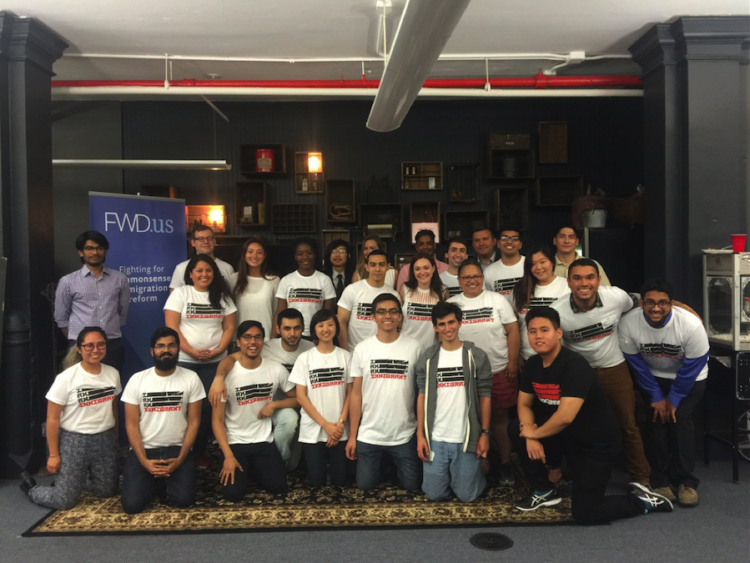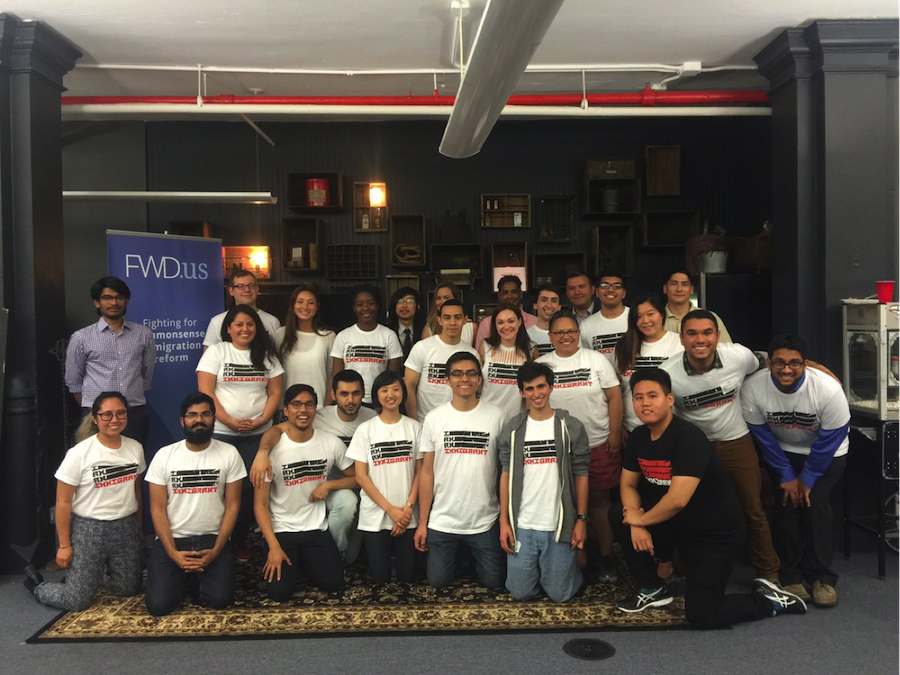This past weekend, the first ever Immigrant Heritage Month Hackathon took place in NYC. Hackers of all levels broke into four teams and worked together to build tools, apps, and platforms to help make New York a more welcoming City for immigrants to live, work, and play.
The first night, participants heard from Kavita Pawria-Sanchez, the Assistant Commissioner at the NYC Mayor’s Office of Immigrant Affairs as well as panelists Monica Sibri, Murad Awawdeh, Arka Bala, and Matt Burnett. They spoke about the present day immigrant experience in New York, and the different opportunities and challenges they face. The mentors also offered some words of advice before the competition began, in addition to the team counseling they would provide on the second day.
Below is a recap of the projects and the competition results:
Alchemy
Team Alchemy, which includes Nelson Igunma, Zong Yuangan, Carolyn Yao, Alex Choulos, and Dhruv Sarin, presented their product Q? NYC, an SMS texting based platform that would give immigrant users access to the info they need to live life in a new place. Team Q identified limited access to information as one of the most pressing problems immigrants face, noting that 57% of foreign born latinos lack access to the internet. Their solution was to create a texting platform where new immigrants could send questions via text to #twilio. The text would be sent to a server node and then the user would receive a text back with the answer. Users could ask things about different government services, libraries, job opportunities and other information. Their marketing strategy was to initially target the hispanic community through community centers and then expand based on the number of users.
A Warm Welcome
The creators of A Warm Welcome, Dan Sicular, Amir Khan, and Katie Wong, saw homesickness as a major problem for immigrants. Their solution was to create an app that would use heat mapping technology in order for users to identify places where they could eat familiar food, places of worship, and community centers for their distinct communities. The heat maps, accessible through a user friendly website that used more images than words, would show the density of restaurants, cultural events, etc. by country of origin. In terms of revenue, the team hoped that the restaurants would eventually buy targeted advertising on the site to have their restaurants featured. The judges also noted that this site might be useful for other populations besides the immigrant population, such as tourists or those in the city looking to experience a different culture.
Transition for Immigrant Life
Iain, Jennifer, Sang Min, Sae-Young, Sunny, Viktor worked together to create TIL, a forum based website for immigrants with an emphasis on trustworthiness. They wanted to address the problem of finding and aggregating disparate information, and presented TIL as a solution. By using TIL, a student could use the site to find all the information they need about attending college in one place–relevant documents, financial aid facts, if they were legally qualified, and different processes they might have to undergo. Fundamental to their idea was the element of trustworthiness they hoped to create by having the site be foreign based, and essentially create a social network for immigrants so they could connect with people that have experienced similar situations. The feedback for the second place winner was that while their revenue model relied heavily on non-profits, they will want to look into other sources of funding. As the second runner up, the TIL team will get a chance to pitch to the NY Tech Meetup for the chance to present at the meetup.
4D Dream – Winner
The 4D Dream Team which included Marianne Dologuin, Niels Bantilan, Osvaldo Rodriguez, Manuel Ruiz, Arthur Godiva and Jea Yoon Lee, came together to create busca.ny, a recommendation based discovery app designed to help streamline the search process for much needed information. 4D Dream identified the problem of underutilized resources as a result of users being burdened by confusing and scattered information. Users of their site or mobile app would be able to choose their language then ask a series of questions to ensure the information they received would be relevant to them. The site would basically consolidate information from different government sites onto one page. It would use nyc.gov as well as coalition resources to ensure accurate, up-to-date while making sure it was at maximum accessibility. Their revenue would be largely generated by targeted advertisements, as well as through the data they would collect through the questionnaire portion of their process. The judges encouraged them to continue to build on their vision of their services as a kind of concierge service for the needs of immigrants new to the city. The 4D dreamers will receive a one month coworking space as well as consulting services so they can continue to improve on and grow their 4D Dream.




